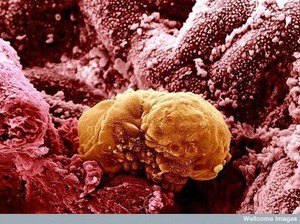Biologicals as monoclonal antibodies (mAb) are highly complex products produced in living systems. They are included as treatment, combined with chemotherapy, for multiple common malignancies as cancer, in first- and second-line treatment regimens. However, the patient’s access to this type of treatment can be limited due to their high cost.
Biosimilars are products that are highly similar to biologicals (called reference medicinal products: RMP); they cannot be considered identical to their RMP due to the natural variation in biologicals and the heterogeneity of production processes.
In the last years, biosimilars have increased global access to biological therapy. The real-world evidence with biosimilars is growing daily, supporting their clinical uses and increasing the confidence among medical practitioners and patients. Many regulatory agencies, such as the European Medicines Agency (EMA), have defined pathways to determine similarity.
Recently, Perez et al. published an article placing the focus on the current state of clinical development for the use of mAb biosimilars in oncology. They analysed the publicly available clinical data until March 2021 of proposed biosimilars for biologicals,
The article provides a global vision that reveals the different clinical development of biosimilars, considered valid and aligned with the guidelines despite being different from each other. The clinical strategies for several companies to develop biosimilars are presented in this review article, discussing and comparing critical factors such as study population, study design and clinical endpoints.
These factors usually focus on resolving any uncertainties between the proposed biosimilar and the RMP after previous steps have been executed. Thus, each company could decide the direction of this analysis following the recommendations included in the regulatory guidelines by performing fewer comparative clinical trials than those required for the RMP.
Usually, the clinical development requirements involve pharmacokinetic/pharmacodynamic (PK/PD) assessments and clinical trials for efficacy and safety limited to one or two sensitive indications of those approved for the RMP. Therefore, to assess the PK profile of a biosimilar, a single-dose study in healthy volunteers is preferred by EMA, considering that this population is likely to have less variability in PK than oncology patients.
Oncology patients represent a group with high variability in response and several confounding factors such as concomitant treatments that hinder the comparative clinical efficacy exercise between the biosimilar and RMP. Together with the accumulated experience in the development of biosimilars and the high-performance analytical tools available, these circumstances should help revisit the requirements for biosimilar development with a view to reducing the need for clinical efficacy trials. This in turn could lead to the update of the current worldwide legislation for biosimilars.
The authors concluded that even when biosimilars for mAbs, such as rituximab, bevacizumab and trastuzumab, can generate a more sustainable healthcare system, it is crucial to understand the relevant aspects of their clinical development, to facilitate their integration into clinical practice.
More action in the context of education for physicians and patients should be carried out to avoid misperceptions and to encourage the use of oncologic biosimilars in clinical practice.
Conflict of interest
The authors of the research paper [1] declared that the article was funded by mAbxience, Luis Pérez Díaz, S Millán, N Chaban and A Campo are employees of mAbxience SRL, E Spitzer is an employee of the Elea Phoenix Laboratory.
Abstracted by Luis Pérez Díaz, MD, Medical Affairs, mAbxience, Spain.
Editor’s comment
Readers interested to learn more about biosimilars in oncology are invited to visit www.gabi-journal.net to view the following manuscript published in GaBI Journal:
Biosimilars in oncology: current and future perspectives
GaBI Journal is indexed in Embase, Scopus, Emerging Sources Citation Index and more.
Readers interested in contributing a research or perspective paper to GaBI Journal – an independent, peer reviewed academic journal – please send us your submission here.
GaBI Journal Citation Impact
1.9 – CiteScore 2020 (calculated on 5 May 2021)
2.0 – CiteScoreTracker 2021 (Last updated on 4 September 2021)
Submit a manuscript to GaBI Journal
Related articles
Biosimilars and interchangeability in oncology
Biosimilars in oncology in Europe
| LATIN AMERICAN FORUM The brand-new section the ‘Latin American Forum’ on GaBI has been launched. The objective of this new section is to provide you with all the latest news and updates on developments of generic and biosimilar medicines in Latin America in Spanish. View this week’s headline article: Requisitos de certificación de BPF en Argentina, Brasil y México Browse the news in the Latin American Forum! Register to receive the GaBI Latin American Forum newsletter. Inform colleagues and friends of this new initiative. LATIN AMERICAN FORUM Se ha lanzado la nueva sección del ‘Foro Latinoamericano’ sobre GaBI. El objetivo de esta nueva sección es brindarle las últimas noticias y actualizaciones sobre desarrollos de medicamentos genéricos y biosimilares en América Latina en español. Vea el artículo principal de esta semana: Requisitos de certificación de BPF en Argentina, Brasil y México Explore las noticias en el Foro Latinoamericano! Regístrese para recibir el boletín informativo GaBI Latin American Forum. Informe a colegas y amigos sobre esta nueva iniciativa.
|
Reference
1. Díaz LP, Millán S, Chaban N, Campo AD, Spitzer E. Current state and comparison of the clinical development of bevacizumab, rituximab and trastuzumab biosimilars. Future Oncol. 2021;17(19):2529-44.
Permission granted to reproduce for personal and non-commercial use only. All other reproduction, copy or reprinting of all or part of any ‘Content’ found on this website is strictly prohibited without the prior consent of the publisher. Contact the publisher to obtain permission before redistributing.
Copyright – Unless otherwise stated all contents of this website are © 2021 Pro Pharma Communications International. All Rights Reserved.








 0
0











Post your comment